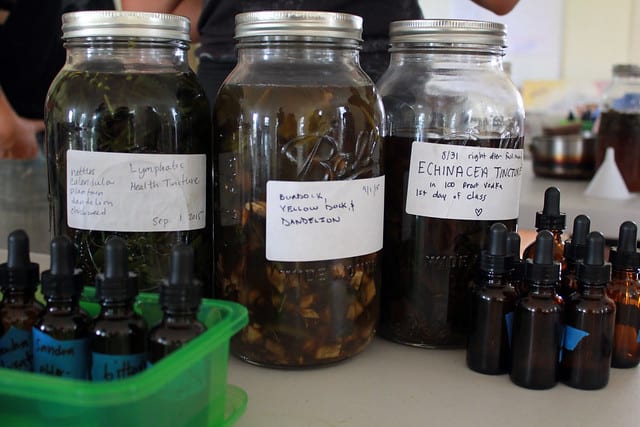
Originally posted in several snippets on the Coming Home Network forum, with some additional material from private correspondence (my side only). A few questions from others are preceded by “Q:” and will be in blue:
* * * * *
I would say, generally, that we should avoid anything in this general area of thinking, and way of life, that has overt reference to hostile eastern religious concepts.
I’m an advocate of health food, holistic health, whole foods, alternative medicine, herbalism, vitamins, etc. myself, but I have steered clear of anything that has false religious philosophy in it. It’s pretty easy to spot. Sometimes one can participate in something that may have originated in eastern religion without partaking in that aspect of it. The martial arts is a clear example of that.
* * *
Q: Would you lump a lot of what passes for “holistic medicine” in with homeopathy?
Well, that’s only a small part of the whole. But many of the remedies one can buy at a health food or vitamin store are homeopathic. One has to examine each thing individually.
Like I wrote in the article, I don’t know all the ins and outs of homeopathic theory (nor do I care to). What I have seen seems goofy and counter-intuitive to me, even irrational. But in a sense it doesn’t matter. If I take a pill and it works, who cares what the method is by which it works? I haven’t adopted any unChristian philosophy. I’m simply taking a pill to make me sleep or stop sneezing, etc., or to help knock off a cold.
It’s better to take a pill that isn’t fully understood, that works, and has no side effects, than to take one that the doctor or pharmacist claims to understand, but doesn’t work, and has bad side effects and a hefty price tag as well. The bottom line is feeling better.
It’s like chiropractors. The medical establishment has bad-mouthed them for years. Meanwhile, millions of us have gone to them and solved our back pain (that, often, the doctors couldn’t alleviate). So let them complain while we feel better. Different strokes, I reckon.
* * *
I’d view acupuncture as similar to homeopathy: if indeed it works it is not necessarily because of the explanations that some proponents give for it. There could very well be other factors involved, and the initial theories are the wrong explanation for why they work.
One could easily use the treatment, while believing nothing along the lines of chi or eastern philosophies. If it works it works. There is no sin (or even illogical thinking) in that.
* * *
Q: But does it matter if the doctor believes in chi? I mean, if you wanted to find the best possible doctor to perform acupuncture, a lot of people would believe that a Chinese doctor who has studied it from its original context is going to know how to best administer it. Would you be willing to suggest someone use this even if the doctor believed he was practicing something incompatible with your religion?
It doesn’t matter, if you don’t believe it. Let him believe what he will. You could believe it works by unknown scientific processes or non-chi processes (if you know something about the science of it), and can benefit by it without believing in anything foreign to Christianity or science.
Whatever the doctor believes is not directly relevant. As far as you or I are concerned, it is simply a technique to alleviate pain or some other condition.
Q: I could understand this from the point of view that St. Paul takes with food sacrificed to idols (1 Corinthians 8). But I also believe that the point he makes in vv. 7–13 is very much to the point. For there are many in this world who will consider you a syncretist — or worse, an idolater — if you partake of these remedies. So what have you gained? Health at the expense of the souls of several of your friends and relatives — or that of the doctor? Then where will your own soul end up?
Well, this is the fine line between liberty and being a potential stumbling block that Paul refers to in 1 Corinthians 8:9. It’s roughly the same thing that many of our Protestant brethren struggle with in regard to use of alcohol. We know that alcohol is permissible (Paul even recommends it for stomach problems; Jesus’ first miracle involved it), but we also know that it causes many to stumble. Same thing with gambling. So what do we do? I think it must, therefore, come down to individual situations.
As for being considered and/or called things, look at what many Protestants think Catholics are: idolaters, half-pagan, Pelagians, synergists, Mariolaters, followers of mere traditions of men, anti-Bible, supposedly devoid of the gospel, etc. Obviously, we can’t change Catholic dogma so *they* won’t be stumbled. They are stumbled because of lack of knowledge (including, ironically, much biblical knowledge).
On this forum we can only present our opinions on the overall issues. Even then someone might be “stumbled” but I don’t know how it is possible to write about a wide range of spiritual / theological topics and completely avoid that.
In person it is a different scenario and more directly applicable, I think, to Paul’s concerns in 1 Corinthians 8:7-13. So if I know that a person is stumbled by acupuncture, thinking that no one could possibly use it or benefit from it without spiritual danger, then around him I would pretty much avoid both the practice and talking about it, just as I would not drink around a known alcoholic. It’s how I have acted around my Protestant family for years. I avoid Catholic things that would stumble them, and try to speak in their language, as Vatican II stressed, following Paul (more on that below).
But just as the existence of alcoholics does not rule out all alcohol use, likewise, the existence of what I would say is an overly legalistic fear of false spiritualities attached to medical practices does not rule out all use of those things whatever.
I think it’s a fine line. I am trying to apply both sides of St. Paul’s concerns in these sorts of issues. In the immediate context of this thread, the question had to do what the doctor personally believed, not with what a possible observer might think is taking place (being potentially scandalized). I answered accordingly.
Now that the issue of scandalized and weak bystanders has been brought in, I am answering in a different way, and adding more nuance to my preceding replies, by acknowledging somewhat paradoxical competing concerns. Clearly, in any event, there are very fine lines and complexities of application.
In the next chapter Paul goes into his discourse about being all things to all people, which is one of my favorite passages of his, and which has been a guide for years to me as I do apologetics and outreach. Thus, when faced with others of certain inclinations, it is best for us to sort of blend in with that and operate from within those paradigms in order to win them over.
But the doctor’s physical / spiritual beliefs vs. the patient’s physical / spiritual beliefs was a different scenario altogether. In other words, I think it is two different things to be discussed, and I’m happy to discuss both, as long as we properly distinguish them.
* * *
Doctors and pharmacists aren’t infallible (in case someone doesn’t know that yet). A few years ago, my mother was on ten different prescription drugs at once. She was actually hallucinating, and was literally diagnosed with Parkinson’s Disease.
My sister and I did some research on drug interactions and discovered that there were about seven conflicting interactions going on there. It was so simple we were able to find this out simply from online drug interaction charts at pharmaceutical sites.
The doctor then reversed her diagnosis. I even found out about a sort of fake Parkinson’s, where the same symptoms can be brought on by side effects of drugs.
This was not a simple error on their part. It was downright incompetence, to make mistakes so absurd that a non-medical professional like myself could determine that it was wrong in a couple hours of Internet searching.
I urge people to use the information now available to at least keep doctors accountable for mistakes such as this. I’m not trying to sue anyone for malpractice. That is not the answer. That’s why we have the high costs we have. I just want people to be healthy and happy (in this case, my own mother).
There are good doctors and bad doctors, just as in any other profession. If legal abortion doesn’t prove that, nothing will.
* * *
“Medicines” (in the broader sense of the term) differ widely in the number and degree of side effects. First of all, one has to define “medicine,” and “drug.” Drugs are created in a laboratory. They are man-made. Many of them have been marvelous in curing people. I don’t disparage that (especially Tylenol, which I take quite a bit!). But they are different from natural supplements. A drug almost always has statistically significant side effects.
Natural supplements have far less (precisely because they are mostly just food products or minerals). I know. I have been taking a full regimen of vitamins, minerals and herbs for 25 years now. Vitamin C has few statistically significant side effects, nor do vitamins B or E or A (it is not absolute and there can always be exceptions in individual cases.
Calcium-Magnesium tablets have no appreciable side effects that I know of, other than relaxation. The same goes for iron chromium doesn’t (I take it for hypoglycemia). It is wrong to say that natural supplements have no possible side effects whatever. But they are demonstrably less than is the case with drugs, unless there are specific interaction precautions that particular people need to abide by.
I can’t take for example, glucosamine chondroitin (used for joint pain) because of my hypoglycemia (it is glucose-based). I can’t have green tea or ginseng because they all have caffeine or other stimulants (again, blood sugar; I get headaches from it). For energy, I use bee pollen and royal jelly. I can’t take a number of things based on my ulcer (spices, acids, alcohols, some dried foods, almonds, etc.). That is because of a condition I already have.
I have controlled my hypoglycemia naturally for 25 years, without any drugs at all. I take B-100, chromium, and eat whole foods (as little as possible white flour and table sugar). I try to eat lots of protein, and am semi-vegetarian, too.
I take other supplements for digestion, which are helpful. The main “side effects” I get come when I eat table sugar or white flour or corn syrup. I then get a whopping migraine headache, quite similar to a hangover (I’ve never been drunk to my knowledge, but from what I hear . . . ).
My wife took Zoloft for seven years for depression. It had many serious and undesirable side effects. We both thought it made her almost zombie-like. It neutralized her natural spirit and made her emotionally “flat”. We substituted amino acids Tyrosine and Taurine, and GABA. These are natural substances (the first two are parts of protein). They’re not drugs. They have very few side effects (none that we have noticed as any sort of identifiable problem). For example, here is what the WebMD site says about side effects for taurine:
Taurine has been used safely in adults in studies lasting up to one year. It has been given safely to children for up to 4 months. People enrolled in research studies have not reported any side effects connected with the use of taurine. However, there is one report of brain damage in a body-builder who took about 14 grams of taurine in combination with insulin and anabolic steroids. It is not known if this was due to the taurine or the other drugs taken.
There is a warning of use for pregnant or breastfeeding women (which is very common across the board).
There are many scientific studies about natural supplements: not as many, probably, as with drugs, but quite a few, and a growing number of doctors are open to “alternative medicine”: so many, that soon, it will have to have a new name, because it will become mainstream. Judy’s depression is gone, and so are the side effects that were having very serious consequences, even to some extent on our marriage. We have taken care of several of Judy’s problems by natural means.
Chiropractic has been a great blessing that has helped her (she has scoliosis too) and also my mother recently. Chiropractors have been demonized and ridiculed for years by the “mainstream” medical profession, but folks go there because they eliminate back pain. Proof’s in the pudding. If someone feels better, they will do what has made them feel better, no matter how many pointy-heads claim that they are not “really” better. We’re not stupid out here (as many medical professionals seem to think). We do what improves our health.
My wife Judy reacted adversely to an antibiotic for pleurisy; I did some research and we got rid of it with natural supplements. She developed fibromyalgia [or, another theory is that it was Lyme Disease or Lyme-related co-infections]. I did some research on that, we got a few more supplements, and it is now 90-95% under control. She successfully took supplements for menopause (black cohosh [widely used in Europe since the mid-50s], dong quai, etc.) and hot flashes (which we eliminated). These things are real. They really help people. They work. It’s not just “in our heads.” I know, because I’ve lived it myself and have seen proof with my wife as well.
This is why I (personally, not in my function as as a moderator here) enthusiastically advocate whole foods, organic foods, and vitamins and minerals and various herbs (herbs are far more chemically complex and many do, indeed, have potentially serious side effects). I don’t advocate anything that is contrary to the Catholic faith. What is natural is part of “God’s green earth.” God gave us the ability to learn what natural substances help various maladies, and he gave us the knowledge also to develop conventional medicine with its drugs and marvelous surgical techniques.
I am not against that. I’m both/and. In medical matters, I’m for what works, by whatever means. I respect few people more than medical doctors and nurses and pharmacists. They are usually extraordinary human beings. But many people are hostile to holistic health and the philosophy behind it. Unfortunately, I think this is often due to the “snake-oil” connotations that the medical and pharmaceutical powers that be have constantly placed on those things.
On the other hand, there is quackery to be found in holistic health circles (sometimes quite a bit in specific areas of it) and some goofy eastern religious stuff and fakes making money. That is true in all areas of life, so it comes as no surprise. We all must develop a proper appreciation for scientific support for these things, and not be taken in by charlatans out to make a buck or sell something that does nothing (back to the snake oil again!): merely acting as a placebo.
Conventional medicine is by no means free from abuse. These are the people who brought us contraception (the Pill) and abortion, and now euthanasia. That goes beyond questions of what “works” to outright sin and immorality and wickedness: men trying to act like God. Conventional medicine has tended to treat childbirth as a “malady” rather than a beautiful natural event (another thing my wife and I feel strongly about).
Hence the astronomical increase in C-sections that are unnecessary. In the past medical science brought us things like eugenics and phrenology and forced sterilization of black people. There is no lack of unethical behavior and quack science there, either. The medical field is not above criticism and needs to clean up its own house; not just attack every “competing” claim that is a little different from the way they usually approach things.
Anything can be abused. This is why we have to do our own examination of any given thing. It’s easier now than ever to study anything, with the Internet. One can access actual medical journals and other scientific materials.
I’m all for all the scientific studies that we can do on anything and everything. But at the same time, I am not averse to the “anecdotal” evidence of personal experience of feeling better. That is valid, too (not “scientifically,” but in its own legitimate way). If scientists can get a bunch of people together who started feeling better together based on a supplement, and test that under the usual controlled conditions, I think they would learn quite a bit. And they do. Proof’s in the pudding.
A recent study, for example, that I read about, tested St. John’s Wort as an antidepressant in children. The results showed that 100% of the doctors / scientists involved, concurred that there was significant improvement. We are trying it with our daughter now. This is not a shot in the dark. It is widely used in Europe (as is black cohosh and other “women’s” supplements) and there is scientific verification of its effectiveness. There are other similar antidepressants like SAM-e.
* * *
I have a problem with the giant systems that develop, the power and hubris involved, and the disdain for others outside of the system. It seems to be human nature to look down our noses at anyone who is different from us, and to not approach them with charity, but with suspicion. We have to see the good and bad that can be found in all movements. And (for the record) that is as true of the holistic health movement as any other.
This is why I’ve always said that we all need to do our own homework. With the massive resources now available in the Internet, without even having to take a trip to the library, there is less excuse for ignorance than ever.
* * *
There are far fewer side effects with natural supplements because they are not drugs. They are more like food, and food has few side effects other than indigestion (!) or normal reactions from abnormal foods like table sugar and white flour, where the nutrients are insanely removed from them (precisely why I advocate natural, whole foods, that are left as God made them, not as man wants them. God knows better than we do).
It’s a simple fact that when you take whole wheat flour and remove the bran and the germ, you have taken out the fiber and almost all of the protein and other nutritional value. Many are aware today of what a massive lack of fiber in our diet can cause (cholesterol, heart trouble, etc.). Taking out protein and other nutrients packed into the germ, does little good, either. I describe that as “raping” because it is a violation of the food as God created it. The end product is demonstrably less nutritious.
I don’t think it is immoral (I eat white flour, too, because it is often included alongside whole wheat for texture reasons, in things like, e.g., multi-grain pancakes), but it is a bad practice that makes no sense because of the dire long term consequences of all the ingestion of this amount of flour, with very little nutritional value. This is a major contributing cause to diabetes and hypoglycemia, among other things. I reaped the consequences in my own life, because I grew up as a junk food junkie.
Everything in moderation. Fat problems are mostly due to excess and saturated fat. Carbohydrates have become a problem primarily because most of what Americans eat has been raped of its nutrients, because it is white flour and/or sugar, with little nutritional value. There is a reason why America is the fattest country in the world.
Meanwhile, we have more cancer and heart disease and diabetes and obesity in this country than we have ever had, and more than most of the world. I happen to think that diet plays a huge role in that, so I am passionate about it, because I care about people and their well-being.
* * *
Whatever the side effects are in our case, I have yet to see them, after 25 years of use. They can possibly interact or clash with other things, but that is on the label. But any side effects from our taking these supplements are so minimal I have never noticed them. Practically speaking, then, they are in effect non-existent.
If someone develops a rash or nausea or a severe headache as a direct result of taking some drug, that is primarily what I am referring to. That is the sense in which the term is routinely used on the bottles of drugs (in the warnings section), and, I submit, how most people (including scientists and doctors) think of it. Perhaps the more accurate word in this sense is “counter-reaction”.
I take drugs (mostly Tylenol [acetaminophen] when I get a headache); my two special-needs sons take them. Thank God for them. I’m not “against” them. I think as few as possible is the ideal, but I have nothing against drugs per se. Far from it. A drug is — in any event — a lot different from something like Vitamin C or an amino acid. I don’t see how it is even arguable.
* * *
The problem comes when some in the medical profession make out that they are greatly, qualitatively different from others, and when they run down holistic advocates (oftentimes, virtually en masse) as snake oil salesmen. The problem arises from our secular society’s uncritical quasi-worship of science (what C. S. Lewis calls “scientism”), almost as if they are the new high priests. If they want to control all the information (just as the liberals and secular media seek to do), I vehemently reject that and will always fight against it, since I oppose all forms of intellectual elitism.
* * *
Alternative medicine and holistic health (whatever anyone thinks of it) is being increasingly accepted in scientific and medical circles. Of that there is no doubt whatever. This may be a good thing or a bad thing (I obviously think it is good), but given a position of respect for science and the studies and experiments involved therein, then it has to be acknowledged that there is more and more scientific support, and therefore, use, of “alternative” treatments all the time.
The very science that I love and respect is, more and more, on the side of the holistic health philosophy and lifestyle. There are plenty of scientific studies. I’ve seen them myself. I am 100% in favor of scientific method, and I detest all quackery and false religious elements, wherever they are found. Scientific verification is good and necessary in many ways. It’s no different in terms of the verification of anything connected with holistic health.
Related Reading:
My web page: Herbalism, Holistic Health, & Alternative Medicine (A Collection).
***
(originally 2-17-10)
Photo credit: Sterling College: Herbalism Intensive_0903 (photo from 9-11-15) [Flickr / CC BY 2.0 license]
***
















